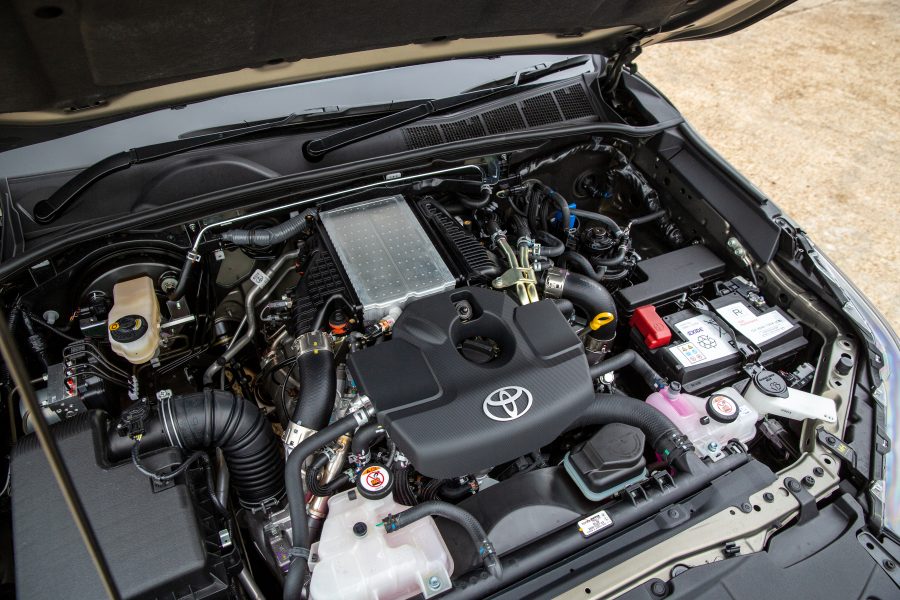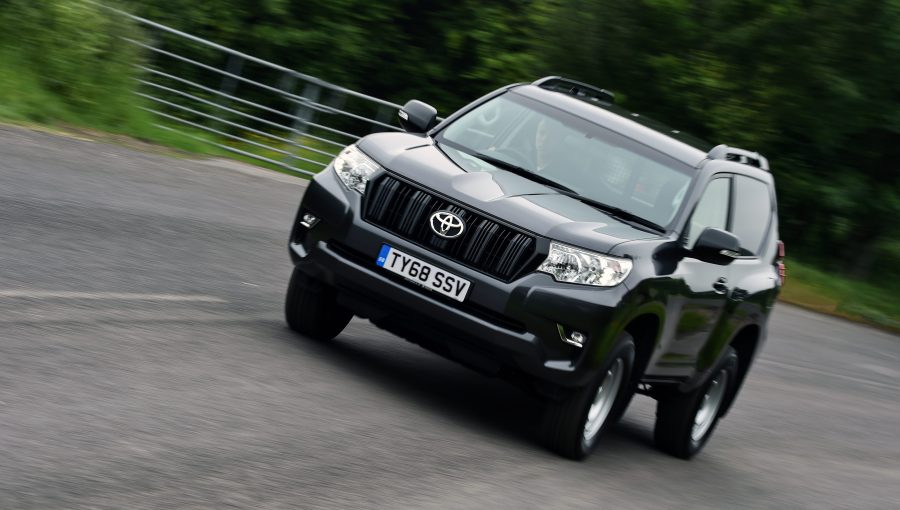Although Toyota’s passenger car range is predominantly focused around petrol-electric hybrid powertrains, the Land Cruiser, Hilux and Proace models are fitted with diesel engines. A diesel particulate filter (DPF) is a feature of these models, and you may have heard about the need for regular DPF regeneration. What does this component do and how do you take care of it?
What does a diesel particulate filter (DPF) do?
The DPF is fitted within the exhaust system and is designed to catch soot particles and nitrous oxide (NOx) from the combustion process that would otherwise be released into the atmosphere. The DPF is highly effective and traps around 80% of these harmful particulates.

Why do modern diesel engines need a DPF?
European legislation places strict exhaust emissions targets on all vehicle manufacturers. From September 2009, the Euro 5 legislative standard came into effect, part of which required all diesel cars registered from that point on to be equipped with a diesel particulate filter, or DPF.
These filters are used throughout the industry in all diesel-powered passenger vehicles, and their efficiency is vital now that stringent Euro 6d emissions standards are in force.
Do I need to replace a DPF during normal servicing?
Diesel particulate filters do have a capacity limit and can become full. But unlike traditional air, oil or pollen filters that need to be exchanged manually at regular intervals, the DPF has a much longer service life and is designed to regenerate to restore its performance.
The car’s electronic control unit (ECU) is programmed to do this automatically, neutralising the soot by burning it off at high temperature within the exhaust system while the vehicle is running. All modern cars with diesel engines follow this procedure.

How does DPF regeneration occur?
The regeneration occurs automatically, usually without the driver being aware that it is taking place. In the majority of cases, the process is carried out when the engine and exhaust system has reached normal operating temperature and the vehicle is travelling at over 40mph.
However, if your driving is limited to urban areas, the low speeds and frequent stops mean the conditions for normal regeneration do not exist. In these instances, the ECU monitors the accumulation of soot and instructs an alternative regeneration programme to begin well before the filter becomes saturated.
This programme injects small quantities of fuel into the engine after combustion, which increases the temperature within the exhaust system and creates an environment where it is possible to safely burn off the soot.
This method is very successful within the small percentage of vehicles where normal regeneration is not possible. However, due to the nature of city traffic, the regeneration process can be interrupted when the vehicle completes its short journey and is turned off. If this occurs, the ECU is programmed to recommence the process when the engine is restarted and back up to temperature again.

How can I help prevent DPF blockages in my Toyota?
Follow these four simple actions:
1. Regularly drive your Toyota on highways at speeds of between 40-55mph for around 20-30 minutes.
2. Avoid spending unnecessary amounts of time with the engine idling.
3, Try to limit the frequency of short journeys where the engine is running for less than ten minutes.
4. Do not ignore dashboard alerts related to the DPF.
Will I be warned if all DPF regeneration processes have been unsuccessful?
Very occasionally, use of the vehicle might be such that it will have been impossible for the ECU to complete the administration of any regeneration procedure. At this point, the DPF will have become overloaded and stopped functioning, so your Toyota will illuminate a warning light in the dashboard. It will then be necessary for the soot to be neutralised and the filter regenerated manually at a main dealer.
It is extremely unwise to ignore this visual warning as the DPF can become irreparably damaged. What’s more, it is illegal to remove the filter entirely.
Learn more: What is the exhaust gas recirculation valve and what does it do?





Hi Ross,
Thanks for your post.
1. DPF problems are more likely to occur when carrying out shorter and more frequent journeys.
2. It has been advised that getting your car to 2000rpm for 20 minutes at a time can help reduce blockages. Getting your vehicle to 70mph for a good run can also help.
3. We do not have any fuel additives in our product range and therefore would not recommend the usage of any.
4. N/A
5. We would advise that changing your oil more regularly isn’t too important. However, making sure the oil is of the correct specification for your vehicle is essential.
6. It is hard to comment on the minimum mileage and we would be unable to say. It is completely dependent on driving styles and conditions.
7. If you were able to provide us with your VIN or registration number we would be able to provide a more accurate price. However, from our system we can see that it could cost around £584.13 Excl. VAT with labour cost on top of this.
Hope this helps. Many thanks.
Hi there
when I bought my 2013 Toyota yaris diesel, I was told there was a full service done on the car , does the dpf filter not come under a full service if it is a consumable product like oil filters air filters etc ?
and also I was not told about dpf when I purchased the car as I live on a small island where staying at 40 mph for a period of 20 min is hard
thank you
paul
Hi Paul.
Thanks for your post. The DPF filter is a legal requirement for all diesel cars. The DPF filter has a much longer service life than air and oil filters because it is designed to clean itself. Therefore, it is not included in a full service. Hope this helps. Many thanks.
I have a 2007 Toyota Quantum 2.5 D4D with 350000kms on the clock. I have a big problem, on my intake pipe the plug thats there has 3wires, I noticed that 1 of the 3 wires broke so the vehicle started making white smoke & i was limited to only drive 80km/h & it wouldnt drive any faster…I’ve fixed that connection & i reset the computer by disconnecting the battery. The white smoke disappeared & i could drive over 80 km/h but then the next day…my vehicle would only drive 80km/h again but this time round its making black smoke & i noticed that i dont hear my turbo spooling up while driving. I resetted my computer a few times but it still drives the same. Please help me because im clueless now.
Hi Winslow,
Thanks for your post! We’re so sorry to hear you’re having these troubles with your car. We would suggest a trip to your local dealers. They will be able to help resolve all the issues you’re experiencing. You can find you local dealer here: http://www.toyota.co.uk/find-your-dealer. Hope this helps!
I’ve owned a GDJ150R Landcruiser for 6 months now and have clocked just over 11000 klms. Almost every day that I start driving, the engine revs at 900 rpm for about 20 mins, then drops back to about 700 rpm. Is it do-ing a DPF burn so often and is this normal for this model. I’ve never experienced this on previous Toyota diesels that I’ve owned. I have been told that a DPF burn should raise the rpm to about 1200rpm. (I dont know if that’s correct or not.)
Hi Kevin,
Thanks for your post. Someone from the customer relations team should be in touch with you! Many thanks.
Hi Kevin,
Have you get the answer yet? I am having the same question.
Thanks
My 2013 Yaris D4D broke down yesterday. The AA recovery man said that the sump had been flooded with diesel and the oil level had risen very high because of DPF regeneration. Thing is, I do 80 miles of dual carriageway driving at 70 mph twice per week so why was it trying to regenerate anyway, and having tried why did it fail and flood the sump instead?
My service indicator light has been on since 7500 miles after the previous service. The dealer said it’s normal. But yesterday the AA man said it was the car telling me that the oil was contaminated. So I’ve been driving round with diesel in my oil, and damaging my engine, for 6 weeks.
Hi Dominic,
We’re so sorry to hear that you’re having trouble. Can we confirm that you’ve been to your local dealer about this issue? They should be able to assist you further with your query. Many thanks!
My Yaris diesel is 4 years old. I had to take it to Toyota last week as it lost power and the engine light came on whilst I was driving on the motorway. I got told the DPF was blocked and that it needed a clean. The service team told me this happens due to the low mileage I do- however when I explained I drive 40 miles to work daily on a dual carriageway at 70mph and twice a month I drive 180 miles round trip to see family they were shocked. I went away happy as I thought my car was fixed.. Well until 6 days later it happened again and again when I was driving home at 70mph when the engine light flashed on. I have been told the filter was blocked again?? and it now needs replacing at a cost of +£800! I don’t know much about cars but after doing some research and speaking to experienced drivers this isn’t an issue that should arise at this stage and taking into consideration the mileage I do? I don’t trust what Toyota are telling me and I truly think there is some sort of fault.
It does seem like a common complaint and big fault with Toyota diesel cars and I certainly think that it should have been highlighted when I bought the car from Toyota.
Hi Rita,
Thanks for your post and we’re sorry to hear you’re having problems. I will take a note of your email address and someone from customer relations will be in touch regarding this problem. Hope this helps!
Rita I am experiencing the same problem. Have you got to the bottom of this yet.
Hi Susan. Have you been in touch with our customer relations team regarding this issue? They will be happy to help: po.st/fH3m6j. Thank you.
Hi Susan, unfortunately not! I’m still going back and forth between my local Toyota and customer relations- there are still a lot of unanswered questions!
Well Rita, it wont make either of us feel better but I have the exact same issue with my 2010 Avensis D4D. Driving to work yesterday morning, power loss, dashboard lights on brought it to a garage who tell me it is a DPF problem. Minimum cost €500, possibly up to €1,500 depending on parts required! I also travel 60km a day to and from work on motorway so no excuse for DPF not clearing normally. Talking to other car owners and mechanics I believe the system is inherently faulty. Toyota can no longer lay claim to the “best built cars…” rubbish.
Hello,
i smell a burn/rubber/exhaust smell in the cabin, starting today.
I donk know what it is, and the smell is pretty strong.
Hi there,
Thanks for your post. We would have to advise getting in touch with your Toyota dealer in order to diagnose what the issue is. You can find your nearest dealer here: https://www.toyota.co.uk/find-your-dealer.json. Hope this helps!